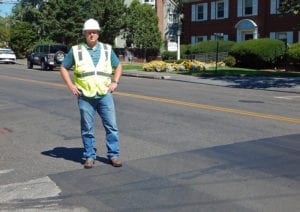Who is a member?
Our members are the local governments of Massachusetts and their elected and appointed leadership.

Lexington Town Engineer John Livsey, who directs the town’s award-winning pavement management program, stands at the threshold of fog seal (rear) and double micro surfacing, or “cape” seal (foreground), on a town road.
The town of Lexington has been honored with a national award recognizing its superior pavement preservation practices.
The 2020 James Sorenson Award for Excellence in Pavement Preservation was presented to Town Engineer John Livsey by the nonprofit trade association FP2 on Oct. 23 at the Lexington Battle Green.
FP2 Executive Director Jim Moulthrop recognized “the commitment that the town and its staff have made in keeping good roads good, and engaging the traveling public in Lexington with the benefits of their program.”
With the number of resident complaints going down and the number of “thank you” emails going up, Lexington leaders say they are pleased with the growing public support and appreciation for their pavement management efforts.
One result of the program is that the town has decreased the network backlog of all required road repairs from a high of $20.35 million in 2012 to $7.25 million in 2020. The town has also reduced the percentage of poorer condition roads requiring major rehabilitation or reconstruction from 39% of the network in 2010 to 15% in 2020.
FP2 cites pavement preservation as the best long-term strategy for cost-effectively providing residents with good roads, and the best way to responsibly manage a community’s most valuable physical asset.
“If you have less money, if your budget is being cut, or even just not being increased, it’s the best time to perform preservation,” Livsey said. “The less you have, the more critical it is to really stretch your dollars and make sure that the better condition roads just do not slip.”
Prior to implementing its pavement preservation initiative, Lexington’s annual work program was like many others in New England, using just three primary treatments. Most funding was spent doing asphalt “mill-and-fill” and full depth reclamation, and any remaining funds were used for crack sealing.
Today, the town uses as many as eight different treatments, each appropriate at different stages of road conditions. To use each repair and maintenance tool effectively, Lexington is committed to keeping the data in its pavement management system up-to-date. The current condition rating of every road segment is estimated annually, including the severity and extent of pavement distresses.
The pavement management program matches the most suitable treatment strategy to each road segment based on these condition ratings, and the engineering staff then works with local contractors to confirm and fine-tune the software’s recommended treatment solution for each road.
Lexington’s public outreach on the program answers the “where” and “when” questions as well as the “what” and “why” questions people have when they see different, nontraditional paving methods being used.
At the start of each construction season, residents with property abutting every road being improved receive a letter and a map detailing all the treatments the town has planned for that year. The town uses its Twitter feed to provide updated construction schedules and detour maps.
Starting with a network pavement condition index (PCI) 10 years ago of only 68, the Select Board accepted the Engineering Division’s goal of attaining an average PCI in the mid-80s. Since then, the town’s Capital Expenditures Committee has supported the program and its proposed budget every year.
Lexington met all four of the Sorenson Award criteria:
• Acceptance of the pavement preservation concept by elected officials, the general public, employees and industry
• Demonstration of preservation principles by using the “right treatment, on the right road, at the right time”
• Use of communication techniques to keep the public notified about upcoming preservation road work in the area
• Uniqueness of the program, including documenting tangible benefits such as increased usable life of the pavement, new concepts or applications employed, reduced user delays during treatment applications, and decreased frequency of reconstruction and major rehabilitation or reconstruction
Lexington’s award was presented by FP2 President Scott Bergkamp.